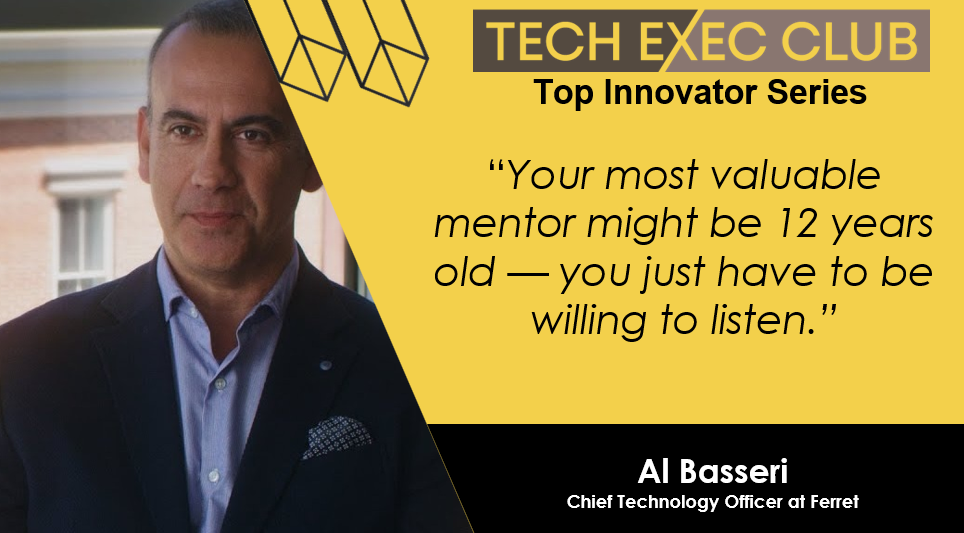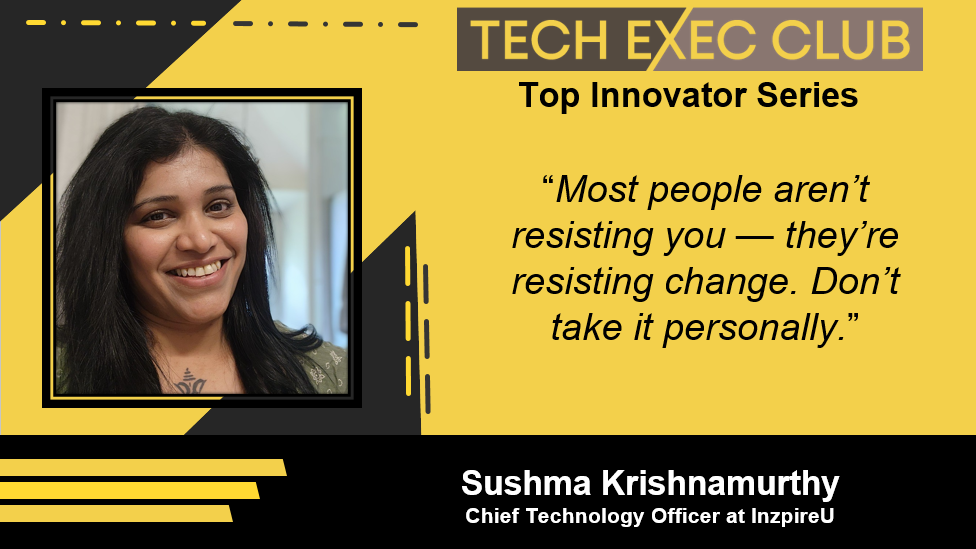When Joseph Shorter speaks about leadership, it doesn’t sound like theory — it sounds like a lived truth forged through hardship, discipline, and unwavering purpose. A former Marine turned CTO, Shorter has led technology teams across industries, but his approach to leadership is anything but conventional. His philosophy is anchored in servant leadership, humility, and a deep belief in human potential — ideas that were shaped on the streets of a tough neighborhood, refined in the rigors of military life and tested in the high-stakes world of tech innovation.
In this candid conversation with Josef Martens, founder of the Tech Executive Club and host of the Top Innovators series, Shorter reveals a journey that spans from being a teenage counselor to troubled peers to becoming the architect of digital systems for the Marine Corps to helping veterans get off the streets — a mission close to his heart as someone who once faced homelessness himself.
But this isn’t just a story about resilience. It’s a masterclass in leadership. From creating cultures where even the newest voices are heard to recognizing that the strongest leaders are the ones who step back, Shorter challenges conventional thinking at every turn. “Leadership is by permission,” he says — a powerful reminder that influence is earned, not inherited, and that the best leaders know how to listen.
As you read on, you’ll discover not only Joseph Shorter’s path but also a profound redefinition of what it means to lead in today’s world.
Servant Leadership as a Core Philosophy
When Joseph Shorter talks about leadership, his words carry a sense of quiet conviction—not because of his titles or accomplishments but because of how deeply rooted his leadership philosophy is in service. “Leadership isn’t about me,” he says plainly. It’s about helping others be more.” This concept took root during his nine years in the U.S. Marine Corps, where he learned early on that good leaders must first be good followers.
But servant leadership is more than a theory for Shorter — a practical, lived discipline. Whether guiding executive teams or mentoring junior engineers, he sees his primary role as clearing obstacles and empowering others to grow. That mindset has shaped his every move, from his earliest days in tech to his current executive roles. When an employee struggles, he doesn’t point fingers — he looks inward and asks, “What could I have done differently to help them thrive?”
It’s a philosophy that challenges the traditional hierarchy many leaders default to. Instead of commanding from the top, Shorter lifts from within. In doing so, he fosters loyalty, resilience, and innovation in his teams. He says, “If leadership is only about you, it’s transactional. But when it’s personal—when people know you’re there for them—that’s when real transformation happens.”
The Importance of Listening and Humility in Leadership
Despite years of experience and accolades, Joseph Shorter is the first to admit he doesn’t have all the answers — precisely what makes him a great leader. “I always bring my confidence into a conversation,” he says. “But I also bring the assumption that I don’t know everything.” That balance — confidence paired with humility — allows Shorter to lead effectively in high-stakes environments where ego often overshadows wisdom.
His leadership evolution includes a pivotal shift: learning to listen more than he speaks. It’s a subtle but powerful distinction. Early in his career, he believed offering solutions was his way of adding value. But over time, he realized that his passion for improvement could come across as criticism — unintentionally diminishing the voices of others. “I had to change from being statement-oriented to question-oriented,” he reflects. “Because when you ask questions, you invite people in.”
Today Shorter uses questions not just to uncover better ideas but also to foster collaboration and co-creation. He knows that the most innovative breakthroughs often emerge when leaders create space for others to think, explore, and challenge assumptions. His mantra is simple but profound: “Leadership is by permission.” And that permission is earned by authority and willingness to listen.
Building Diverse and Empowered Teams
In an industry where technical prowess often trumps people skills, Joseph Shorter brings a refreshing counterpoint: authentic leadership means building teams that are smarter than you — and making space for them to thrive. “I started realizing that the best leaders get the smartest people in the room with them,” he says. “Because you can’t know it all. You can’t do it all.”
Shorter’s belief in intellectual diversity is not just aspirational — it’s operational. He actively creates cultures where new voices are valued, junior team members are encouraged to speak up, and differences in thought are treated as fuel for progress, not friction. He knows from experience how easy it is for leaders to inadvertently silence others by dominating a conversation. His solution? Step back, listen more, and trust the people you’ve hired.
He also rejects the lone genius myth — the idea that one brilliant individual can carry an organization. Instead, he emphasizes collective intelligence and psychological safety. In one vivid example, he recalls how a junior employee brought a new perspective that completely shifted the team’s approach — not because she was experienced, but because she was fresh. “She had an idea I hadn’t thought of. That’s why she was hired.”
To Shorter, building empowered teams isn’t just good leadership — it’s essential for innovation. “If you’re the smartest person in the room,” he says, “you’ve hired the wrong team.”
Leading with Humanity — Personal Connection in Professional Spaces
For Joseph Shorter, leadership isn’t a job title—it’s a relationship. “We’re social beings,” he says. “If you take that out of your leadership, it just doesn’t work.” Many technologists learn this truth too late: emotional intelligence often matters more than technical skill when building high-performance teams.
Shorter makes a strong case for bringing humanity back into leadership. He shares a striking example of an employee who was underperforming — not because of lack of skill, but because his child was undergoing cancer treatment. “Nobody ever asked him what was going on,” Shorter recalls. “But I did. And when I adjusted his workload and gave him time, he was our top performer six months later.”
It’s a recurring theme in his leadership: treat people like people, not resources. Understand what makes them tick, what burdens they carry, and what motivates them. Shorter has taken so-called “problem employees” and turned them into top contributors—not with discipline but with empathy. “If I’m here for you,” he says, “that will benefit me and the organization.”
His approach is deeply personal — so much so that his long-term leadership goal is to be remembered as a boss and a lasting influence in people’s lives. “If I get invited to someone’s wedding,” he says with a smile, “I know I’ve done it right.”
Learning from Hardship — Life Lessons from the Military and Homelessness
If one thing sets Joseph Shorter apart, it’s his lived experience — a story filled with adversity, perseverance, and purpose. Raised in a rough neighborhood, Shorter became a counselor to streetwise peers before he was even out of his teens. That instinct to guide others only deepened during his years in the Marine Corps, where he not only served but innovated, building the first-ever budgeting system for the Corps.
But perhaps the most defining chapter came later—a period of homelessness that could have derailed his career. Instead, it became a source of empathy and drive. “Being CTO at a nonprofit working to end veteran homelessness meant something to me,” he says, ” because I had been there myself.”
That experience didn’t make him bitter — it made him better. It reinforced his belief that everyone has potential and that leaders are responsible for unlocking it. His leadership style isn’t just informed by books or business school — it’s forged in lived realities, where compassion isn’t optional; it’s vital.
His journey also reminds us that resilience is a leadership skill that can’t be taught in a seminar. “Every hard moment has made me the leader I am today,” he says. “You can either be broken by life or shaped by it. I chose to be shaped.”
What You Can Take Away and Apply Today
Joseph Shorter’s leadership journey offers a wealth of actionable wisdom for anyone navigating the worlds of innovation, technology, or team management. Whether you’re a seasoned executive or an emerging leader, here are practical takeaways you can implement in your leadership practice starting today:
1. Shift Your Mindset: Serve First, Lead Second: Embrace servant leadership as a guiding principle. Ask yourself daily: How can I make my team’s work easier, more impactful, and more fulfilling? Measure your leadership success not by your wins but by how many others succeed because of you.
2. Make Listening to Your Superpower: Replace statements with questions — invite participation rather than direct it. Cultivate humble confidence: Be secure in what you know but curious about what others might know better. Use active listening to spark innovation and deepen collaboration.
3. Build Teams That Challenge You: Surround yourself with people more intelligent than you in specific domains. Foster a culture of psychological safety so that every voice, no matter how junior, can be heard. Encourage team members to challenge your ideas — not just implement them.
4. Lead Like a Human, Not Just a Manager: Don’t separate the personal from the professional — they are deeply interconnected. Take time to understand your team’s lives beyond the job description. Be the leader invited to a wedding, not just a status meeting.
5. Turn Hardship Into Fuel, Not Friction: Use adversity as a leadership asset. Your most difficult experiences may become your most valuable lessons. Share your story — vulnerability builds trust. Never assume you know what others are going through; compassionate leadership is always effective.
6. Make Leadership Intentional: Leadership is not about control; it’s about creating space for others to thrive. Remind yourself daily that leadership is by permission, not position. Reflect regularly on how your leadership is perceived and what impact you’re leaving behind.
Joseph Shorter is not your typical tech executive. His leadership isn’t wrapped in jargon or posturing but in a profoundly human approach that centers on service, humility, and empathy. His journey—from rough neighborhoods to military service, from homelessness to boardrooms—has shaped his character and his clarity of purpose: to lead in a way that leaves people better than he found them.
Through this conversation, it’s clear that Shorter’s impact extends beyond technology. He builds cultures, not just systems. He mentors people, not just teams. He sets a powerful example for modern leadership — deeply personal, unapologetically compassionate, and rooted in a servant’s heart.
As organizations strive to become more innovative, agile, and inclusive, leaders like Joseph Shorter offer a blueprint for what’s possible when we shift our focus from authority to authenticity. He reminds us that authentic leadership is not about being the loudest in the room but about listening, empowering, and elevating those around us.
In a world of noise, Joseph Shorter’s voice rings clear: leadership is not something you take—it’s something others choose to give you. When that leadership is rooted in trust, humanity, and purpose, it can transform teams and lives.
Want to hear Joseph Shorter’s insights firsthand? Watch the full, live podcast interview [click here]





